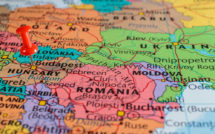
Europe Today: Transnationalism, Globalisms, and Geographies of Pan-Europe (II)

This is part of our special feature, Imagining, Thinking, and Teaching Europe.
In reading over the syllabus, I am reminded of the challenges of teaching Europe as important shifts in material circumstances, policy arenas, and even environmental conditions change the terrain on which we stand and about which we teach. This is peculiarly inflected when teaching American students, and particularly so when teaching Geographies of Europe. My typical class is 30 students of whom two-thirds are 3rd or 4th year students who are “from” or have studied and/or travelled in Europe, and many of these are majoring in European Studies of one kind or another. The remaining one third are often computer science majors or arts majors, or they are focusing on Asia, and for them this is their first encounter with Europe, let alone the Geography of Europe. Typically, each class has two or three exchange students visiting from Europe and often there is one or two MA students from UNC’s Global or European Studies graduate Masters program.
I am sure that many instructors go through the same anxieties and ambivalences faced with such mixes of students. The redeeming element of my students, perhaps by luck, is that they are keen to read, attend and be attentive, engage, and write well.
One result of these uncertainties about Europe, discipline, and student mix is that I have constantly changed the syllabus. My second syllabus here is from this Spring (2020). Perhaps the clarity and crispness of the earlier syllabus has slipped away in the growing number and complexity of topics I now introduce to students. Perhaps the most noticeable change is the expansion of topics on the environment and environmental change, on geo-historical and cultural landscapes and legacies, and on the production of public spaces and public lives.
―John Pickles
Syllabus II (2020)
For Syllabus I (2006) click here.
GEOGRAPHY 464 Spring 2020
EUROPE TODAY: TRANSNATIONAL, GLOBAL, AND IMMIGRANT EUROPE
Course Description and Goals
“Europe Today” is an upper division undergraduate course focused on the processes and patterns of transnational and global Europe, and the ways in which these processes and patterns have reshaped and are reshaping everyday lives, economies, and places across the continent. In developing an understanding of Europe Today, the course will focus on the diverse and shifting geographies of Europe, including environmental patterns and changes, the built environment and differential mobilization of historical legacies and memories, the expansion and consolidation of the European Union; post-socialism and post-fascism in Central and Southern Europe; economic globalization; and post-colonial immigration; and contemporary struggles over a ‘borderless’ Europe versus a “Fortress Europe.”
The course is organized around required readings, lectures, in-class and out-of-class exercises, and discussions. Key texts are provided digitally and online. Each is linked to weekly concepts and topics. Throughout the semester we will integrate concrete urban, regional, and national case studies to illustrate more general processes and patterns. In addition to scholarly readings, students will be exposed to primary texts such as speeches, pamphlets, EU documents, social movement publications, art groups exhibitions, statistical data, as well as papers by government and non- government agencies dealing with social issues of various kinds. Class time will consist of lectures that contextualize the readings, discussion of selected readings, different class exercises and basic quizzes. Videos and films will be integrated into class times wherever possible. Some will be required out of class time. Students will carry out weekly readings and report-backs, write short response papers, and take several short quizzes.
About the Instructor: Professor Pickles
I was born in the industrial coal and textile region of the North of the United Kingdom, studied at Oxford University, and then taught and carried out research at the University of Natal in South Africa. I moved to the US in 1978 to study for my PhD at the Pennsylvania State University, and have since taught at Ohio University, West Virginia University, the University of Kentucky, and―for the past 19 years―at UNC, where I was the first Distinguished Professor of International Studies (now Global Studies). I have also held short-term visiting appointments at the University of Minnesota, the University of Trieste (Italy), the Economics University in Bratislava (Slovakia), Kliment Ohridski University of Sofia (Bulgaria), and Queen Mary University of London. My research and writing has focused primarily on the global economy and worlds of work, economic integration in Europe, migration and border management in the Mediterranean, philosophies and cultural theories of space and place, and the history and uses of maps.
Classroom Rules
The use of cellphones is not allowed during class time. Laptops may NOT be used. As a norm turn-off and place your devices in your bag. There is growing evidence that the use of laptops functions as a transmissions system from lecture to computer through your fingers, short-circuiting important kinds of thinking. For information on this, and on the value of taking your own notes, read:
- Thuy Ong. Evidence mounts that laptops are terrible for students at lectures: Time to reconsider the notebook and pen. The Verge, November 27, 2017 https://www.theverge.com/platform/amp/2017/11/27/16703904/laptop-learning-lecture
- Shannon Doyle. Should Teachers and Professors Ban Student Use of Laptops in Class? – The New York Times, 27 November 2017. https://mobile.nytimes.com/2017/11/27/learning/should-teachers-and-professors-ban-student-use-of-laptops-in-class.html?smid=fb-share&referer=https://m.facebook.com/
Be sure to buy a good notebook or ring-binder for your course notes, sketches, and other materials.
Take a few minutes to watch this short video: Study LESS Study SMART, Motivation2Study. YouTube.com December 10, 2017 [12:03 mins]. https://www.youtube.com/watch?v=AL08YZCYShc
Readings
Readings for each class meeting and each week will be available on Sakai. All assigned readings should be completed prior to the designated class meeting, unless otherwise specified. They will be part of class discussion and an important part of written papers, and exams.
Students should also become regular readers of at least one Europe-based news source. Explore these sites to find ones that interest you. If you read in a language other than English, work with a newspaper or online news source in that language. Preferably choose several from different countries and spend an hour or two each week quickly reading the coverage across each of a similar topic to better understand how different national presses represent and deal with those issues.
For English language readers
BBC Europe Online: http://news.bbc.co.uk/2/hi/
EUObserver.com: http://euobserver.com/
Online European newspapers: http://www.onlinenewspapers.
El Pais English https://elpais.com/elpais/
Le monde diplomatique https://mondediplo.com/
The Guardian (UK) https://www.theguardian.com/
The Independent (UK) https://www.independent.co.uk/
Frankfurter Allgemeine https://www.faz.net/aktuell/
World Newspapers Europe (many to choose from) http://www.world-newspapers.
REQUIREMENTS
Participation and attendance are required for all aspects and meetings of the class. Excused absences should be requested by email prior to class. Unexcused absences will affect your final grade.
Reading: All readings and videos assigned are required, unless otherwise indicated as “browse”, “suggested”, “recommended”, or “optional”. The required readings and video viewings should be completed as indicated each week. You will be asked to refer to the texts in class discussions, in questions, and in exams. One goal of the course is to integrate these materials into our thinking and discussions about Europe; and yes, author names (and spelling) do matter in scholarly work.
All readings will be available either in .pdf or a URL form. We will be drawing on the .pdf version of The Europeans by Ostergren and Rice, as well as more specific texts for each topic.
Writing and Presentation Projects:
- Short Research Papers (2). These papers should each focus on a distinct aspect of the course. The paper can build on lectures and assigned readings, but must include further academic and/or public policy texts and original data collected by the author. Each paper should be about three-four pages single-spaced (no more than 4), plus an appendix of at least one data table AND one or two maps or photographic images. More detailed paper guidelines will be provided separately.
Resume review: I ask you to submit a hardcopy of your resume to me on Thursday January 16th. I review your resumes early in the semester partly to get to know your backgrounds and interests in order to shape parts of the course and my lectures, and partly to develop special content around issues such as study abroad. Since many of you are either graduating seniors preparing for graduate school or jobs after the spring or you are considering Study Abroad or Exchange Study options for next summer or beyond, I take the opportunity to advise on your preparation and presentation of yourself, your skills, and your preparation. This is NOT a graded exercise, just a courtesy and a useful tool for me.
Grading: Four short quizzes on geographical locations will be given during the semester. These will variously test students’ knowledge of places, features, and regional structures and organizations.
- Participation: Attendance/Reading/Discussion/Presentations/Exercise =20%
- Quizzes (4 @ 5%) =20%
- Short Research Papers (2x 10%) =20%
- Mid-semester and Final Examinations (2×20%) =40%
Scores are not “curved” and I have no limit to the proportion of good and excellent grades awarded each semester. That is entirely dependent on performance, participation, and attendance. Attendance is required by the University and participation is important for the success of the course.
All University rules on the Honor Code apply and University regulations and practices on access, special needs, safety, respectful speech, and inter-personal behavior will be respected. If you have special needs or concerns, please bring them to my attention immediately.
Helpful Dates (some may change as weather and course activities demand):
1.16: Resume submission due.
1.21: Quiz 1. Countries (10 mins 11:00-11:10am – arrive on time).
1.23: Library Scavenger Hunt exercise due.
1.30: Quiz 2: Physical Features (10 mins 11:00-11:10am – arrive on time).
2.13: QUIZ 3: Capital Cities plus the main cities such as Venice, Istanbul, Amsterdam, etc.
(10 mins 11:00-11:10am – arrive on time)
2.27: Mid-Semester Exam (In class – 80 minutes).
3.17: RESEARCH PAPER 1 SUBMISSION
Exercise: Communism, Central Planning, 1989, and Post-Socialism
3.24/26: Exercise: Prehodi Documentary
3.31: QUIZ 4: Uniting Europe (15 mins 11:00-11:15am – arrive on time).Exercise: EU Data Workshop (BRING LAPTOPS)
4.2: Exercise: EU Treaties.
4.23: RESEARCH PAPER 2 SUBMISSION
4.27 Final Examination: Monday April 27th noon-3:00pm.
WEEKLY TOPICS
INTRODUCTION: WHERE IS EUROPE?
1.9: Why “Global, Transnational, and Immigrant Europe”?
1.14: Where is Europe?
1.16: Where is Europe at UNC?
TRANSNATIONAL NATURES
1.21: Landforms and Landscapes
1.23: Glaciation and Northern European Landscapes
1.28: Climate adaptation in Cities
1.30: Living With (and Below) Water: the Ijberg Experiment, Amsterdam.
CITY SPACES AND URBAN PUBLICS
2.4: Urban Europe: Origin, Form, and Function
2.6: Sea-City States and the Mediterranean: Sicily, Venice, Aragon, and Andalucia
2.11: Hanseatic Towns and the Northern Seas: Lynn/Boston, Bruges/Lubeck vs Amsterdam:
2.13: Amsterdam, Mare Liberum, and the Liberal City
2.18: The Rise of Colonial/Industrial Britain and the Making of the English Working Class: Manchester
2.20: The Making of European Publics: Paris
2.25: Memorial Landscapes: Rome, Berlin, London
2.27: Mid-Semester Exam
FROM SOCIAL EUROPE TO NEOLIBERAL EUROPE
3.3: The Origins of the European Community
3.5: From Common Market to the European Union: Brussels, Luxembourg.
3.10: NO CLASS. Spring Break
3.12: NO CLASS. Spring Break.
3.17: The ‘Other’ Europe: Communism, State Socialism, and the Eastern Bloc
3.19: Emerging from Totalitarianism
3.24 Prehodi 1: Transitions – Post-Socialist European Lives
3.26: Prehodi 2: Transitions – Post-Socialist European Lives
POST-COLONIAL (OR IMMIGRANT) EUROPE
3.31: Tourism vs Community: Venice and Barcelona
4.2: Brexit: Where Do We Now Stand?
4.7: Small States and Secessionist Movements
4.9: The Eurozone, Precarious Economies, and Illiberal Democracies
4.14: Aging Europe?
4.16: Re-bordering Europe -Schengen Borders and Fortress Europe
4.21: European Futures
4.23: European Futures
Final Examination: Monday April 27th noon-3:00pm.
TOPICS AND READINGS
INTRODUCTION: WHERE IS EUROPE?
Thursday 9 January: Why “The Geography of Europe Today- Global, Transnational, and Immigrant Europe”?
Keywords and concepts: Geography, regions, culture regions (instituted, naively perceived, and denoted).
- Ostergren and Rice. Chapter 1, Culture Regions and the Concept of the Region, (pp. 1-9). The Europeans,
In class watch the short videos:
- History of Europe – 6013 years in 3 minutes: https://www.youtube.com/watch?v=uxDyJ_6N-6A
- What is Brexit? https://fbwat.ch/1ThEPPZ6JSQU0gT7
Tuesday 14 January: Where is Europe?
Keywords and concepts: Territory, boundaries, maps, and regional identity.
- Kalypso Nicolaidis. Europe’s Ends (pp. 236-255). In Claudia Wiesner and Meike Schmidt-Gleim (eds.) The Meaning of Europe: Changes and Exchanges of a Contested Concept. Routledge: London and New York, 2014.
- Case: Uri Friedman. 12 Maps that Changed the World. The Atlantic, 30 December 2013 http://www.theatlantic.com/international/archive/2013/12/12-maps-that-changed-the-world/282666/
- After class assignment –
- Explore the variety of websites: ‘Europe? Which Europe? Which Future Europe?’ http://web.inter.nl.net/users/Paul.Treanor/which.europe.html
Thursday 16 January: Where is Europe at UNC?
Keywords and concepts: European Studies, Monet Center of Excellence, UNC resources.
- Raento, Pauliina. ‘Teaching European Identities’, Journal of Geography in Higher Education, 32: 3, September 2008, pp. 347 — 364.
In class discussion of our reading and exploration of UNC-Europe.
- Center for European Studies: A Jean Monnet Center of Excellence: https://europe.unc.edu/
- Office of Study Abroad: https://studyabroad.unc.edu/
- Your Europe? Be prepared to say a few sentences about your background in Europe or experience with study abroad or travel in Europe or your hopes/plans to do the same. If you do not have such experience or plans, perhaps a sentence or two on how you think about Europe.
- Paris Summer Program: https://heelsabroad.unc.edu/index.cfm?FuseAction=Programs.ViewProgram&Program_ID=10254
RESUME Submission due.
After class Library Scavenger Hunt.
TRANSNATIONAL NATURES
Tuesday 21 January: Landforms and Landscapes
Keywords and concepts: Landforms, landscapes, environments, plate tectonics, subduction, volcanic and earthquake boundaries, mountain building.
- Ostergren and Rice. Chapter 2, European Environments (pp. 35-66). The Europeans.
- Environments and Landscapes pp. 58-68 (.pdf posted): http://www.pearsonhighered.com/samplechapter/013229835X.pdf
QUIZ 1: Countries (10 mins 11:00-11:10am – arrive on time).
Thursday 23 January: Glaciation and Northern European Landscapes
Keywords and concepts: Glaciation, continental and Alpine glaciation, U-shaped glacial valleys, outwash plains, loess, climate change, disturbance and perturbation.
- Clémence Pèlegrin. The New Commission’s Climate Goals. Foundation Robert Schuman Policy Paper. European Issues #528, 24th September 2019
- Climate change taking a big bite out of alpine glaciers. Deutsche Welle, March 17, 2017. https://www.dw.com/en/climate-change-taking-big-bite-out-of-alpine-glaciers/a-38416950
- Volker Bingenheimer and Adam Walder. Climate change threatens Luxembourg’s ice wine production. Luxembourg Times, 13 December 2018. https://luxtimes.lu/luxembourg/35908-climate-change-threatens-luxembourg-s-ice-wine-production
Library Scavenger Hunt exercise due.
Tuesday 28 January: Climate adaptation in Cities: the case of Venice
- European Environmental Agency. Climate change impacts and adaptation (18 February 2015): https://www.eea.europa.eu/soer-2015/europe/climate-change-impacts-and-adaptation
- European Environmental Agency. Executive Summary (pp. 6-12). Urban adaptation to climate change in Europe 2016. Transforming cities in a changing climate. European Environmental Agency Report No. 12/2016. https://www.eea.europa.eu/publications/urban-adaptation-2016/urban-adaptation-2016/viewfile#pdfjs.action=download
- Can coastal cities innovate their way out of seal-level rise? Deutsche Welle, 2017. http://www.dw.com/en/can-coastal-cities-innovate-their-way-out-of-sea-level-rise/a-38748038
- Jon Henley and Angela Giuffrida. Two people die as Venice floods at highest level in 50 years. The Guardian 13th November 2019. https://www.theguardian.com/environment/2019/nov/13/waves-in-st-marks-square-as-venice-flooded-highest-tide-in-50-years?sfns=mo
Thursday 30 January: Living With (and Below) Water: the case of the Ijberg Experiment in Amsterdam.
- Urban green-blue grids. Ijburg, Amsterdam, The Netherlands. http://www.urbangreenbluegrids.com/projects/ijburg-amsterdam-the-netherlands/
- Case: Feargus O’Sullivan. Amsterdam’s Bold Housing Solution: 10 Artificial Islands. CityLab, June 11, 2015. https://www.citylab.com/amp/article/395516/
- Case: Feargus O’Sullivan. Here Comes Amsterdam’s Lean, Green Community on an Artificial Island. August 14, 2018. https://www.citylab.com/amp/article/567383/?__twitter_impression=true
- After Class Exploration: Vanessa Rutgers. Ijburg, Amsterdam. November 5, 2015. https://issuu.com/blogwerk/docs/ijburg_a4-final.20mb
QUIZ 2: Physical Features (10 mins 11:00-11:10am – arrive on time).
CITY SPACES AND URBAN PUBLICS
Tuesday 4 February: Urban Europe: Origin, Form, and Function
- Chapter 4: Rural and Urban Settlements (pp. 86-113). Geography of Europe. [.pdf]
- Case: Christopher Ingraham. How 2,000-year-old roads predict modern-day prosperity. Washington Post, August 7, 2018. https://www.washingtonpost.com/business/2018/08/06/how-year-old-roads-predict-modern-day-prosperity/?noredirect=on&utm_term=.c90084b9cc2d
Thursday 6 February: Sea-City States and the Mediterranean: Venice, Aragon, and Andalucia
- C. Darby. The Medieval sea‐state, Scottish Geographical Magazine, 1932, 48(3), 136-149.
- Richard Covington. East Meets West in Venice. Muslim Heritage. Saudi Aramco World. March/April 2008, vol. 59, N° 2.
- After class watch: “When the Moors Ruled Spain” (video 1:42:01): https://www.youtube.com/watch?v=yA6dm7CCSDA
Tuesday 11 February: Hanseatic Towns and the Northern Seas: Lynn/Boston, Bruges/Lubeck vs Amsterdam:
- Stephen Halliday. The First Common Market? History Today, July 2009, 59(7), pp. 31-37.
- Klaus Friedland. The Hanseatic League and Hanse Towns in the Early Penetration of the North. Arctic 37(4), December 1984, pp. 539-543.
-
- Listen to the 15 minute BBC radio piece on Hans Holbein and the Hansa — http://www.bbc.co.uk/programmes/b04k6rls
- Explore: The European Hansamuseum, Lubeck: http://www.hansemuseum.eu/museum-2/exhibition/
–In-class exercise: Explore the Hansa town map: https://www.hanse.org/en/hanse-historic/hanse-map/
–Recommended Video: “Lubeck and the Hanseatic League: The Birthplace of the Common Market with David Abulafia”. Watch from minute 3:30 on. https://www.youtube.com/watch?v=UV51rAFqiLE
Thursday 13 February: Amsterdam, Mare Liberum, and the Liberal City
- Why is Amsterdam so Tolerant? https://www.dutchamsterdam.nl/171-why-is-amsterdam-so-tolerant
Tuesday 18 February: The Rise of Colonial/Industrial Britain and the Making of the English Working Class City: Manchester and Lancashire
- Engels. Introduction. The Condition of the Working Class in England. (1845 in German. 1885 in English).
- P. Thompson. Preface (pp. 9-14). The Making of the English Working Class. New York: Vintage Books, 1963.
- Watch: ‘Matchstalk Men and Dogs: L.S. Lowry’ (4.09 mins) https://youtu.be/Y_zVdQ8YehQ
- BBC Documentary on L.S. Lowry, 1957 (15:15 mins) https://youtu.be/pkEEjq3gR4c
QUIZ 3: Capital Cities plus the main cities such as Venice, Istanbul, Amsterdam, etc.
(10 mins 11:00-11:10am – arrive on time).
Thursday 20 February: The Making of European Publics: Paris
- Kim Willsher. Haussmann rips up Paris – and divides France to this day. The Guardian. 31 March 2016. https://www.theguardian.com/cities/2016/mar/31/story-cities-12-paris-baron-haussmann-france-urban-planner-napoleon
- Carolyn McDowall. Impressionism & Modernism – Fashionable Life, Paris 1860-80. The Culture Concept Circle. September 14, 2013. https://www.thecultureconcept.com/impressionism-modernism-fashionable-life-paris-1860-80
- Jason Farago. Caillebotte: The painter who captured Paris in flux. BBC online 6 July 2015. http://www.bbc.com/culture/story/20150706-caillebotte-the-painter-who-captured-paris-in-flux
- Manet and Hausmannization: The Origins of Impressionism and the Depiction of Paris.https://rmschwartz.wordpress.com/paris/the-new-streets-of-paris-an-investigation-into-baron-haussmanns-controversial-urban-planning-project/artistic-responses-manet-caillbotte-and-baudelaire/manet-and-haussmannization-the-origins-of-impressionism-and-the-depiction-of-paris/
Tuesday 25 February: Memorial Landscapes: Rome, Berlin, London
- Fraser Cameron. The Impact of the First World War and Its Implications for Europe Today. Heinrich Boell Stiftung, 8 July 2014.
- Heffernan, M. War and the shaping of Europe. In Graham, B.J. (ed.) (1998) Modern Europe, place, culture, identity. Arnold, London. 89-120.
- Christopher Reed. Catastrophe Mapped: a new way of seeing World War 1. Harvard magazine. September/October 2014. http://harvardmagazine.com/2014/09/catastrophe-mapped
Thursday 27 February: Mid-Semester Exam (In class – 80 minutes).
FROM SOCIAL EUROPE TO NEOLIBERAL EUROPE
Tuesday 3 March: The Origins of the European Community
- Chapter One: Introducing the EU (pp. 2-3). In The EU: A Guide for Americans (.pdf) Download at: http://www.euintheus.org/wp-content/uploads/2015/04/GUIDE_2015.pdf
- Derek Urwin. Chapter One. The Community of Europe.
Thursday 5 March: From Common Market to the European Union: Brussels, Luxembourg.
- Derek Urwin. Chapter 2, The Community of Europe.
- Chapter 2: How is the European Union Run? (pp. 6-12). In The EU: A Guide for Americans (.pdf)
- Case: Matthew Yglesias, 8 September 2014. 38 Maps That Explain Europe http://www.vox.com/2014/9/8/6103453/38-maps-that-explain-europe
Tuesday 10 March: NO CLASS. Spring Break
Thursday 12 March: NO CLASS. Spring Break.
Tuesday 17 March: The “Other” Europe: Communism, State Socialism, and the Eastern Bloc
- Hope M. Harrison. Introduction: The Berlin Wall and German Historical Memory. In After the Berlin Wall Memory and the Making of the New Germany, 1989 to the Present. Online publication date: September 2019, pp 1-29. https://www.cambridge.org/core/services/aop-cambridge-core/content/view/E47D4FD85896B8BE779EB77166AF3DB6/9781107049314int_1-29.pdf/introduction_the_berlin_wall_and_german_historical_memory.pdf
- Dennis P. Hupchick and Harold E. Cox. The Palgrave Concise Historical Atlas of Eastern Europe. Palgrave, 2001, pp. 3-9 (Eastern Europe – Political, Physical, Demographic), 110-111 (Eastern Europe, 1948-1991), pp. 112-113 (Wars of Yugoslav Succession, 1991-1995), and pp. 114-115 (The Kosovo Crisis, 1999).
- Ivan Berend. Chapter 4: The centrally planned economic system. An Economic History of Twentieth Century Europe. Cambridge University Press, 2006, pp. 133-164.
- Explore ‘A Visual Guide to the Cold War. UNC Center for European Studies’, https://coldwar.unc.edu/
RESEARCH PAPER 1 SUBMISSION
Exercise: Communism, Central Planning, 1989, and Post-Socialism
Thursday 19 March: Emerging from Totalitarianism
- Ulrich Sedelmeier. Europe after the Eastern Enlargement of the European Union, 2004-2014. Heinrich Boell Stiftung Europe for Citizens.
- Ramona Bloj. Emerging from totalitarianism. Foundation Robert Schuman Policy Paper. European Issues #535, 5thNovember 2019.
Tuesday 24 March: Prehodi 1: Transitions – Post-Socialist European Lives
- EU Enlargement: Past, Present, and Future. Conference by Ambassador Philippe Beke Cluj University Babes Bolyia. 28th of May 2012.
-
- Watch: Prehodi.
- In-class Exercise:
Thursday 26 March: Prehodi 2: Transitions – Post-Socialist European Lives
- Frank Baasner. What lessons are to be learnt from the last regional elections in Germany’s east? Foundation Robert Schuman Policy Paper. European Issues #527, 17th September 2019.
-
- Watch: Prehodi.
- In-class Exercise:
POST-COLONIAL (OR IMMIGRANT) EUROPE
Tuesday 31 March: Tourism vs Community: Venice and Barcelona
- Richard Florida. The Global Tourism Backlash. CityLab, 7 August 2019. https://www.citylab.com/life/2018/08/the-global-tourism-backlash/566228/
- Neil Hughes. ‘Tourists go home’: anti-tourism industry protest in Barcelona, Social Movement Studies, 17:4, 2018, 471-477.
- Case: Will Coldwell. First Venice and Barcelona: now anti-tourism marches spread across Europe. The Guardian, 10 August 2017. https://www.theguardian.com/travel/2017/aug/10/anti-tourism-marches-spread-across-europe-venice-barcelona
- Case: Feargus O’Sullivan. Barcelona Finds a Way to Control Its Airbnb Market. City Lab. June 6, 2018. https://www.citylab.com/life/2018/06/barcelona-finds-a-way-to-control-its-airbnb-market/562187/?utm_source=SFTwitter
- Case: Joost de Vries. My Amsterdam is being un-created by mass tourism. The Guardian, 8 August 2018. https://amp.theguardian.com/commentisfree/2018/aug/08/amsterdam-ian-mcewan-mass-tourism-stag-parties-cities-europe?__twitter_impression=true
After class Exercise: EU Data and Mapping
QUIZ 4: Uniting Europe (15 mins 11:00-11:15am – arrive on time).
Thursday 2 April: Brexit: Where Do We Now Stand?
- Fintan O’Toole. It was never about Europe. Brexit is Britain’s reckoning with itself. The Guardian. Friday 18thJanuary 2019. https://www.theguardian.com/commentisfree/2019/jan/18/europe-brexit-britain-state-politics-fit-for-purpose
- Nicholas Boyle. The problem with the English: England doesn’t want to be just another member of a team. The New European. 7 April 2017. https://www.theneweuropean.co.uk/top-stories/the-problem-with-the-english-england-doesn-t-want-to-be-just-another-member-of-a-team-1-4851882
- Video: Brexit parody sees Andy Serkis revive Gollum in protest against Theresa May’s ‘precious’ deal. https://www.abc.net.au/news/2018-12-10/andy-serkis-takes-on-theresa-may-in-brexit-video/10599292
- In-class Discussion of Exercise: EU Treaties (short exercise).
Tuesday 7 April: Small States and Secessionist Movements
- Matthias Bieri. Separatism in the EU. CSS Analysis in Security Policy. No.160, September 2014, pp. 1-3.
.
Thursday, 9 April: The Eurozone, Precarious Economies, and Illiberal Democracies
- Vedran Dzihic. Illiberal Democracy: A European Issue. http://www.oiip.ac.at/fileadmin/Unterlagen/Dateien/Publikationen/ACTIVIZENSHIP_2_WEB_dzihic.pdf
Tuesday 14 April: Aging Europe?
- Ostergren and Rice, Chapter 3: The European Population Today, The Europeans. pp. 93-99.
- Pages 1-11 in Kurz: Demographic Futures http://www.berlin-institut.org/fileadmin/user_upload/Europa/Kurz_Europa_e_Map.pdf
- Case: Feargus O’Sullivan. Mapping Where Europe’s Population Is Moving, Aging, and Finding Work. CityLab, September 27, 2017. https://www.citylab.com/life/2017/09/european-demographics-aging-employment-migration/540084/
Thursday 16 April: Rebordering Europe -Schengen Borders and Fortress Europe
- Sandra Ponzanesia and Bolette B. Blaagaard. In the name of Europe. Social Identities 17, No. 1, January 2011, 1-10
- The Schengen system: a highly problematic freedom of movement (pp. 36-64). An Atlas of Migration in Europe: A critical geography of migration policies. The full Atlas is available online through UNC Libraries.
- Frontex: at the margins of Europe and the law (pp. 52-55) An Atlas of Migration in Europe: A critical geography of migration policies. The full Atlas is available online through UNC Libraries.
Tuesday 21 April: European Futures
- No reading assigned
Thursday 23 April: European Futures
- No reading assigned
RESEARCH PAPER 2 SUBMISSION
Final Examination: Monday April 27th noon-3:00pm.
John Pickles is the Daniel W. Patterson Distinguished Professor of Geography and International Studies in the Department of Geography and the Curriculum in Global Studies at the University of North Carolina, Chapel Hill. He holds PhDs from the Pennsylvania State University and the University of Natal, and MA and BA (Hons) from Oxford University. His primary areas of research and teaching deal with the economic geography of contemporary Europe, the history of ideas, and post-socialist Europe. He currently works on three related areas of research; the changing dynamics in apparel global value chains and their effects on the geographies of production and employment in different regions; post-socialist economies and the integration of Central and East European countries into the EU; and migration routes and border management in Euro-Med. He has published numerous books on cultural and geographical theory and the economic geographies of post-socialist Europe, including: Anomie of the Earth: Philosophy, Politics, Autonomy (co-edited, Duke University Press, 2015), A History of Spaces: Cartographic Reason, Mapping, and the Geo-Coded World(Routledge, 2004), Articulations of Capital: Global Production Networks and Regional Transformations (co-authored with Adrian Smith, Wiley, 2016), and Toward Better Work – Understanding Labour in Apparel Global Value Chains (co-edited, Macmillan 2013)
Published on June 2, 2020.




